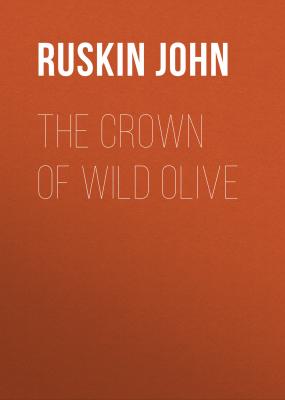The Crown of Wild Olive. Ruskin John
Читать онлайн.| Название | The Crown of Wild Olive |
|---|---|
| Автор произведения | Ruskin John |
| Жанр | Зарубежная старинная литература |
| Серия | |
| Издательство | Зарубежная старинная литература |
| Год выпуска | 0 |
| isbn |
158. The way to get more clothes is—not, necessarily, to get more cotton. There were words written twenty years ago93 which would have saved many of us some shivering, had they been minded in time. Shall we read them again?
"The Continental people, it would seem, are importing our machinery, beginning to spin cotton, and manufacture for themselves; to cut us out of this market, and then out of that! Sad news, indeed; but irremediable. By no means the saddest news—the saddest news, is that we should find our national existence, as I sometimes hear it said, depend on selling manufactured cotton at a farthing an ell cheaper than any other people. A most narrow stand for a great nation to base itself on! A stand which, with all the Corn-law abrogations conceivable, I do not think will be capable of enduring.
"My friends, suppose we quitted that stand; suppose we came honestly down from it and said—'This is our minimum of cotton prices; we care not, for the present, to make cotton any cheaper. Do you, if it seem so blessed to you, make cotton cheaper. Fill your lungs with cotton fur, your heart with copperas fumes, with rage and mutiny; become ye the general gnomes of Europe, slaves of the lamp!' I admire a nation which fancies it will die if it do not undersell all other nations to the end of the world. Brothers, we will cease to undersell them; we will be content to equal-sell them; to be happy selling equally with them! I do not see the use of underselling them: cotton-cloth is already twopence a yard, or lower; and yet bare backs were never more numerous among us. Let inventive men cease to spend their existence incessantly contriving how cotton can be made cheaper; and try to invent a little how cotton at its present cheapness could be somewhat justlier divided among us.
"Let inventive men consider—whether the secret of this universe does after all consist in making money. With a hell which means—'failing to make money,' I do not think there is any heaven possible that would suit one well. In brief, all this Mammon gospel of supply-and-demand, competition laissez faire, and devil take the hindmost (foremost, is it not, rather, Mr. Carlyle?), 'begins to be one of the shabbiest gospels ever preached.'"
159. The way to produce more fuel94 is first to make your coal mines safer, by sinking more shafts; then set all your convicts to work in them, and if, as is to be hoped, you succeed in diminishing the supply of that sort of labourer, consider what means there may be, first, of growing forest where its growth will improve climate; secondly, of splintering the forests which now make continents of fruitful land pathless and poisonous, into fagots for fire;—so gaining at once dominion icewards and sunwards. Your steam power has been given (you will find eventually) for work such as that: and not for excursion trains, to give the labourer a moment's breath, at the peril of his breath for ever, from amidst the cities which it has crushed into masses of corruption. When you know how to build cities, and how to rule them, you will be able to breathe in their streets, and the "excursion" will be the afternoon's walk or game in the fields round them.
160. "But nothing of this work will pay?"
No; no more than it pays to dust your rooms, or wash your doorsteps. It will pay; not at first in currency, but in that which is the end and the source of currency,—in life; (and in currency richly afterwards). It will pay in that which is more than life,—in light, whose true price has not yet been reckoned in any currency, and yet into the image of which, all wealth, one way or other, must be cast. For your riches must either be as the lightning, which,
Begot but in a cloud,
Though shining bright, and speaking loud,
Whilst it begins, concludes its violent race;
And, where it gilds, it wounds the place;—
or else, as the lightning of the sacred sign, which shines from one part of the heaven to the other. There is no other choice; you must either take dust for deity, spectre for possession, fettered dream for life, and for epitaph, this reversed verse of the great Hebrew hymn of economy (Psalm cxii.):—"He hath gathered together, he hath stripped the poor, his iniquity remaineth for ever:"—or else, having the sun of justice to shine on you, and the sincere substance of good in your possession, and the pure law and liberty of life within you, leave men to write this better legend over your grave:—
"He hath dispersed abroad. He hath given to the poor. His righteousness remaineth for ever."
Конец ознакомительного фрагмента.
Текст предоставлен ООО «ЛитРес».
Прочитайте эту книгу целиком, купив полную легальную версию на ЛитРес.
Безопасно оплатить книгу можно банковской картой Visa, MasterCard, Maestro, со счета мобильного телефона, с платежного терминала, в салоне МТС или Связной, через PayPal, WebMoney, Яндекс.Деньги, QIWI Кошелек, бонусными картами или другим удобным Вам способом.
